The following is an excerpt from the book, An Illustrated History of Slavic Misery: The good and the great of Slavic history, dusted off and celebrated, which you can read more about here and here, and buy online here.
The Balkan Cliff Richard with a James Dean Death
Every nation has its pop stars these days, even Wales. Since the explosion of music television in the 1980s musical ability has often taken a back seat to the marketable and the beautiful. Aesthetics have become every bit as important as talent, if not more so. Superstars have been born, and superstars have been created. This superstar-adoration inevitably leads to people from faraway lands being compared to some of the most historic stars from the west, such as the Elvis of the so-and-so, the Cliff Richard of that place there. The man who the BBC described as the Elvis of the Balkans was probably closer to being the Cliff Richard of the Balkans, and was a man with a typically tragic story. His life ended when he was just 26. This man was Toše Proeski.
Toše Proeski was born in Prilep and grew up in Kruševo in an Aromanian (or Vlach) family. The Aromanians are an ethnic group native to the southern Balkans, ironically the entire historical lands of Macedonia (Northern Greece, Bulgaria, Macedonia). They surprisingly speak Aromanian, a Latin-derived language similar to Romanian, and whilst they make up less than one percent of the country's population they comprise approximately 20 percent of the population of Kruševo. Toše’s first taste of the sweet spotlight of super-stardom came at the age of 12, when he performed at a Children's Song Festival called Zlatno Slavejce (Golden Nightingale). His first big break came at the age of 16 in 1997, when he became something of a staple on the festival circuit in Macedonia. His fan base grew quickly and it became clear that the cherub-faced 16-year-old prodigy was likely to make buddies with the rich and famous lifestyle sooner rather than later. His clean cut image and obvious marketability almost made this an inevitability. Two years later he released his debut album, Nekade vo Nokta, or Somewhere in the Night. That same year Proeski performed his first solo concert in Skopje. The paper had been lit.
It was his third album, Ako me poglednes vo oci (If You Look Into My Eyes) that removed the word 'potential' and cemented Toše as a true Balkan music superstar. The songs were in both Macedonian and Serbian, and a sellout tour of the Balkans soon followed. He headed to New York to improve his craft, taking singing lessons from Luciano Pavarotti's former coach. A humanitarian tour followed before Toše finally made it to the Eurovision stage in 2004, representing his home nation.
He may have only finished 14th, but Proeski was one of the most heavily featured artists of the contest due to his unique operatic style. The increased international media attention led to him being made a UNICEF Goodwill Ambassador in 2004, with his song This World becoming the official UNICEF anthem. His fifth album, Po tebe (‘After You’) was released, and it dominated the Balkan music charts for months on end. Even to this day it remains one of the most successful Balkan albums ever released. His final album, Igra bez granici (Games Without Borders) would include songs in all the languages of the former Yugoslavia. He entered his final year in the Skopje Music Academy, and at the age of just 26 Toše Proeski truly was a pan-Yugoslav hero. His final gig was on October 5, 2007, in aid of USAID in Skopje. Tragedy followed soon after.
In the early hours of October 16, 2007, Toše Proeski died in a car accident near Nova Gradiška, Croatia. He was the passenger in a car carrying four people, but he was the only one who did not make it out alive. One other passenger suffered head trauma, but remarkably only Proeski met his end.
His death hit the nation of Macedonia and indeed all of the Balkans extremely hard. His body was immediately flown back to Skopje by helicopter, and October 17 thus became a day of national mourning. He received a state funeral in Kruševo, an event that broadcast live on national television. Decorated with the Macedonian flag, his coffin was lowered into the ground with a full gun salute. Thousands attended the final goodbye to a man who clearly was Macedonia's greatest cultural ambassador of modern times.
Proeski was and is special because he built bridges between different nations and ethnicities, and not once did he fall prey to the nationalist fervour sweeping the Balkans. He was one of those rare figures that seemed to transcend the everyday, an individual respected and revered in homes from Ljubljana to Skopje and everywhere in-between. He was without doubt the most mourned Yugoslav figure since Tito himself. Whilst known as the Balkan Elvis, it's perhaps more accurate to refer to him as the Balkan Cliff Richard, a comparison that many of my generation may scoff at despite its positive intention. He had good looks, a strong voice and an assured confidence that was backed up by a wholesome image and unshakeable religious faith. He sang mostly in Macedonian and Serbian, but also performed in Croatian, Bosnian and Slovenian. He was the star the Balkans needed. To show that he was about more than money, he once famously shrugged off the effects of piracy, saying that as a youngster in tough financial times he would have chosen a pirated version for free over paying for an actual copy.
And for that, if nothing else, we should salute the memory of Toše Proeski.
Just a reminder: the preceding was an edited excerpt from the book, An Illustrated History of Slavic Misery: The good and the great of Slavic history, dusted off and celebrated, which you can read more about here and here, and buy online here.


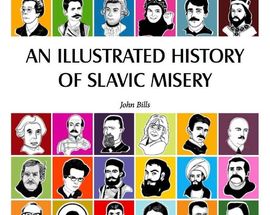
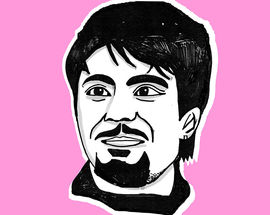
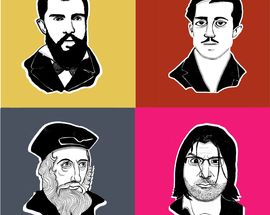
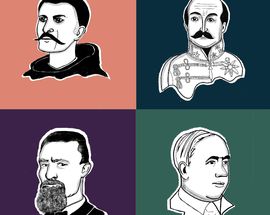
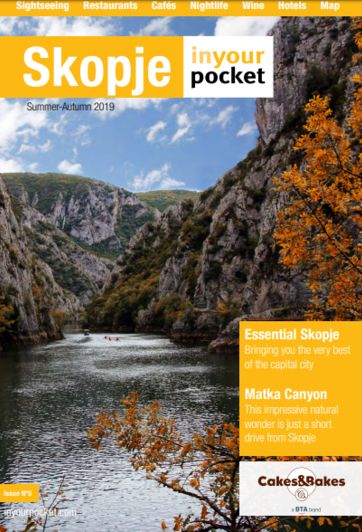


Comments